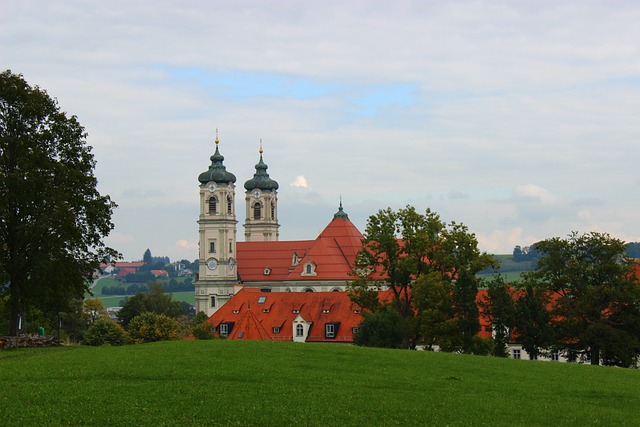A diocese is a territorial division within the Catholic Church, overseen by a bishop who is responsible for the spiritual and administrative needs of the faithful in that area. Each diocese is made up of parishes, schools, and other institutions that serve the local community. The bishop is the spiritual leader of the diocese and is responsible for overseeing the sacramental life of the Church, as well as providing pastoral care and guidance to the people under his authority.
Table of Contents
Definition of Diocese in the Catholic Church
Have you ever heard the term “diocese” in relation to the Catholic Church and wondered what it actually means? Well, you’re not alone! Many people are unfamiliar with this term and its significance within the Church. In this article, we will explore the definition of a diocese in the Catholic Church and its role in the organization and structure of the Church.
So, what exactly is a diocese? In simple terms, a diocese is a geographical area that is under the jurisdiction of a bishop. Each diocese is led by a bishop who is responsible for overseeing the spiritual and administrative needs of the Catholic community within that particular region. The word “diocese” comes from the Greek word “dioikesis,” which means “administration” or “management.”
Dioceses are further divided into smaller administrative units called parishes, which are led by priests. These parishes serve as the local congregations where Catholics gather for worship, sacraments, and community activities. The bishop is the head of the diocese and has the authority to make decisions regarding the spiritual and temporal affairs of the Church within his jurisdiction.
The diocese plays a crucial role in the organization and structure of the Catholic Church. It serves as the basic unit of Church governance and provides a framework for the administration of the Church’s mission and ministry. Each diocese is part of a larger ecclesiastical structure known as a province, which is overseen by an archbishop. The archbishop has authority over multiple dioceses within the province and serves as a regional leader in the Church hierarchy.
Dioceses are also connected to the universal Church through their relationship with the Pope, who is the head of the Catholic Church. The Pope appoints bishops to lead dioceses and has the authority to make decisions that affect the entire Church. This hierarchical structure ensures unity and cohesion within the Church and allows for effective communication and coordination of efforts across different regions.
In addition to their administrative role, dioceses also play a vital role in the spiritual life of Catholics. The bishop is responsible for providing pastoral care to the faithful, teaching the faith, and promoting social justice and charitable works within the diocese. He also has the authority to ordain priests, deacons, and other ministers of the Church, as well as to administer the sacraments.
Overall, the diocese is a fundamental unit of the Catholic Church that serves as a local expression of the universal Church. It provides a framework for the governance and administration of the Church’s mission and ministry, as well as a source of spiritual guidance and pastoral care for the faithful. By understanding the role of the diocese in the Church, we can better appreciate the rich tradition and history of Catholicism and the important role that each diocese plays in spreading the Gospel and building up the Kingdom of God.
Role of a Bishop in a Diocese
Have you ever wondered what a diocese is in the Catholic Church? If you’re not familiar with the term, don’t worry – you’re not alone! A diocese is a geographical area that is under the jurisdiction of a bishop. In the Catholic Church, a diocese is led by a bishop who is responsible for overseeing the spiritual and administrative needs of the faithful within that particular region.
The role of a bishop in a diocese is crucial to the functioning of the Church. Bishops are ordained members of the clergy who have been given the authority to teach, sanctify, and govern the faithful in their diocese. They are seen as successors to the apostles and are entrusted with the task of shepherding the people of God.
One of the primary responsibilities of a bishop in a diocese is to teach the faith. Bishops are called to proclaim the Gospel and to ensure that the teachings of the Church are faithfully passed on to the faithful. They are responsible for providing spiritual guidance and direction to the members of their diocese, helping them to grow in their relationship with God and to deepen their understanding of the Catholic faith.
In addition to teaching, bishops are also responsible for sanctifying the faithful. This includes overseeing the celebration of the sacraments, particularly the Eucharist, which is at the heart of the Church’s life. Bishops are responsible for ensuring that the sacraments are celebrated reverently and in accordance with the teachings of the Church, so that the faithful may receive the grace they need to live out their faith.
Finally, bishops are called to govern the diocese. This involves overseeing the day-to-day operations of the Church, including the administration of parishes, schools, and other institutions within the diocese. Bishops are responsible for making decisions that will help the Church to fulfill its mission of spreading the Gospel and serving the needs of the faithful.
In addition to these primary responsibilities, bishops also have a number of other duties within their diocese. They are called to be shepherds of their flock, caring for the spiritual and pastoral needs of the people entrusted to their care. Bishops are also called to be leaders in their communities, working to promote justice, peace, and the common good.
Overall, the role of a bishop in a diocese is one of great responsibility and privilege. Bishops are called to be spiritual fathers to the faithful, guiding them on their journey of faith and helping them to grow closer to God. They are called to be shepherds of their flock, leading them with love and compassion. And they are called to be leaders in their communities, working to build up the Kingdom of God here on earth.
So the next time you hear the term “diocese” mentioned in the context of the Catholic Church, remember that it refers to a geographical area that is under the care of a bishop. And remember the important role that bishops play in shepherding the faithful, teaching the faith, and leading the Church in its mission of spreading the Gospel.
Structure of a Diocese

Have you ever heard the term “diocese” in relation to the Catholic Church and wondered what it actually means? In simple terms, a diocese is a geographical area that is under the jurisdiction of a bishop. It is essentially a district or region that is overseen by a bishop who is responsible for the spiritual well-being of the Catholics living within that area.
The structure of a diocese is quite fascinating and plays a crucial role in the functioning of the Catholic Church. Each diocese is headed by a bishop, who is considered the spiritual leader of the diocese. The bishop is responsible for overseeing the priests, deacons, and other clergy members within the diocese, as well as ensuring that the teachings of the Church are being upheld.
Within a diocese, there are also various parishes, which are individual communities of Catholics who come together to worship and practice their faith. Each parish is led by a priest, who is appointed by the bishop to serve the spiritual needs of the parishioners. The priest is responsible for celebrating Mass, administering the sacraments, and providing pastoral care to the members of the parish.
In addition to the bishop and priests, there are also deacons within a diocese. Deacons are ordained ministers who assist the bishop and priests in their pastoral duties. They are often involved in outreach programs, charitable work, and other ministries within the diocese.
One of the key functions of a diocese is to provide spiritual guidance and support to the Catholics living within its boundaries. The bishop, priests, and deacons work together to ensure that the faithful have access to the sacraments, religious education, and pastoral care. They also strive to build a sense of community and unity among the members of the diocese.
Another important aspect of a diocese is its role in promoting social justice and serving the needs of the less fortunate. Many dioceses have outreach programs, charitable organizations, and social justice initiatives that aim to help those in need and promote the values of compassion and solidarity.
Overall, the structure of a diocese is designed to support the spiritual growth and well-being of the Catholics living within its boundaries. The bishop, priests, and deacons work together to provide pastoral care, administer the sacraments, and promote social justice within the diocese. By fostering a sense of community and unity, the diocese plays a vital role in the life of the Catholic Church and in the lives of its members.
Responsibilities of a Diocesan Priest
Have you ever wondered what a diocese is in the Catholic Church? If you’re not familiar with the term, don’t worry – you’re not alone. A diocese is a geographical area that is under the jurisdiction of a bishop. It is essentially a district or region that is overseen by a bishop who is responsible for the spiritual well-being of the Catholics living within that area.
In the Catholic Church, a diocese is divided into parishes, each of which is led by a priest. These priests, known as diocesan priests, play a crucial role in the life of the Church and the communities they serve. They are responsible for providing spiritual guidance, administering the sacraments, and caring for the needs of their parishioners.
One of the primary responsibilities of a diocesan priest is to celebrate Mass and administer the sacraments. The Mass is the central act of worship in the Catholic Church, and it is the duty of the priest to preside over the celebration of the Eucharist. In addition to celebrating Mass, diocesan priests also administer the sacraments of Baptism, Confirmation, Reconciliation, Anointing of the Sick, Holy Orders, and Matrimony.
Diocesan priests are also responsible for providing pastoral care to their parishioners. This includes visiting the sick and homebound, counseling those in need, and offering spiritual guidance to individuals and families. Diocesan priests are often called upon to provide comfort and support to those who are experiencing difficult times in their lives.
In addition to their pastoral duties, diocesan priests are also responsible for overseeing the day-to-day operations of their parish. This includes managing the parish budget, coordinating parish activities and events, and working with parish staff and volunteers to ensure that the needs of the community are being met.
Diocesan priests are also called to be leaders in their communities. They are often involved in social justice initiatives, outreach programs, and other efforts to serve those in need. Diocesan priests are called to be a visible presence in their communities, offering support and guidance to all who seek their help.
Overall, the responsibilities of a diocesan priest are varied and demanding. They are called to be spiritual leaders, pastoral caregivers, administrators, and community advocates. It is a challenging but rewarding vocation that requires dedication, compassion, and a deep commitment to serving others.
In conclusion, diocesan priests play a vital role in the life of the Catholic Church and the communities they serve. They are called to be shepherds to their flocks, guiding them on their spiritual journey and providing support and care along the way. The responsibilities of a diocesan priest are many, but with faith and perseverance, they are able to fulfill their calling and make a positive impact on the lives of those they serve.
Importance of Dioceses in the Catholic Church
Have you ever heard the term “diocese” in relation to the Catholic Church and wondered what it actually means? Dioceses play a crucial role in the structure and organization of the Catholic Church, serving as administrative regions overseen by a bishop. In this article, we will explore the importance of dioceses in the Catholic Church and how they contribute to the spiritual well-being of the faithful.
Dioceses are geographical areas that are divided into smaller parishes, each led by a priest who serves as the spiritual leader of the community. The bishop, who is the head of the diocese, is responsible for overseeing the pastoral care of the faithful within his jurisdiction. This includes making decisions on matters of faith and morals, as well as providing guidance and support to the priests and deacons serving in the diocese.
One of the key functions of a diocese is to ensure that the teachings of the Catholic Church are upheld and communicated effectively to the faithful. The bishop plays a central role in this by providing pastoral care, administering the sacraments, and teaching the doctrines of the Church. Through his leadership, the bishop helps to foster a sense of unity and cohesion among the members of the diocese, creating a strong sense of community and belonging.
Dioceses also play a vital role in the administration of the Church’s resources, including financial assets and property. The bishop is responsible for overseeing the financial management of the diocese, ensuring that funds are used wisely and in accordance with Church teachings. This includes supporting charitable works, maintaining church buildings, and providing for the needs of the clergy and staff.
In addition to their administrative functions, dioceses serve as centers of spiritual growth and development for the faithful. Through the celebration of the sacraments, the preaching of the Gospel, and the offering of pastoral care, dioceses help to nurture the spiritual life of the faithful and deepen their relationship with God. This is especially important in today’s fast-paced and secular world, where many people are searching for meaning and purpose in their lives.
Furthermore, dioceses play a crucial role in promoting social justice and serving the needs of the poor and marginalized. The bishop, as the shepherd of his flock, is called to be a voice for the voiceless and a champion for those who are suffering. Through his leadership, the bishop can mobilize the resources of the diocese to address issues of poverty, injustice, and inequality, working to build a more just and compassionate society.
In conclusion, dioceses are an essential part of the structure and organization of the Catholic Church, serving as centers of spiritual growth, community, and service. Through their leadership and pastoral care, bishops help to guide the faithful on their journey of faith and provide support and encouragement in times of need. As we continue to navigate the challenges of the modern world, the role of dioceses in the Catholic Church remains as important as ever, offering a beacon of hope and light in a world that is often dark and uncertain.
Conclusion
A diocese in the Catholic Church is a territorial division under the jurisdiction of a bishop. It is responsible for overseeing the spiritual and administrative needs of the faithful within its boundaries. The diocese is an essential part of the hierarchical structure of the Church, serving as a local representation of the universal Church.


